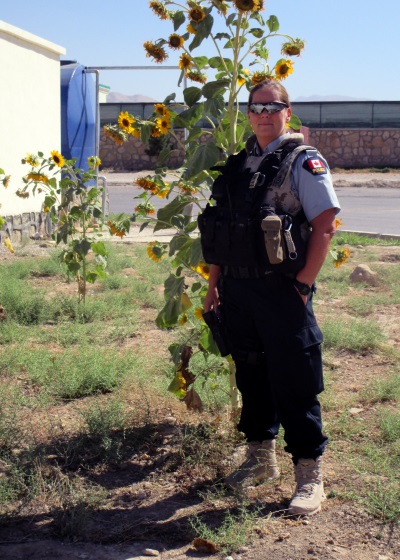
University of Guelph-Humber Justice Studies professor Kimberley O’Toole recently took part in a panel discussion about the role of women in peacebuilding and diplomacy. The panel, which was hosted by the NATO Association of Canada, was held as part of their campaign against gender-based violence.

Professor O’Toole, who has been teaching at UofGH since 2007, spoke about her 21 years of experience as a member of the Toronto Police Service as well as the year she spent on a peacekeeping mission in Afghanistan. From 2013-14, Prof. O’Toole was stationed in Mazar-i-Sharif, one of Afghanistan’s most populous cities, as a gender and human rights advisor and rule of law expert. She was tasked with mentoring members of the Afghan National Police and prosecutors in the Attorney General’s Office. At the NATO panel, Prof. O’Toole spoke about the challenges she encountered while on her mission.
“One of the biggest challenges I had was building trust with my mentees, which was a long, complicated and multi-faceted process,” she says. “In Afghan culture trust, honour and reputation are paramount to building a relationship, so I had to have the right language officer and had to spend many days having tea, talking about my career and my personal life, showing them that I was credible.”
Once Prof. O’Toole built a rapport with her mentees, a process that she says took up to three months in some cases, she began training them in human rights law. As an expert in gender issues, she was acutely aware of the potential and the problems present for women in peacekeeping roles.
“Why they want women in peacekeeping missions and why missions with women seem to be more successful is because you have access to 100 percent of the population. Male peacekeepers are often restricted in their access to female police or community members,” she says.
Those gender barriers were also on display in the Afghan National Police. Prior to Prof. O’Toole’s time in Afghanistan, then-President Hamid Karzai declared he would employ 10,000 female officers in the police force, but their integration was inconsistent.
“Many of the women who were hired had a hard time gaining credibility. While some were working in positions of leadership, a lot were assigned to cooking and cleaning roles. They were frustrated that they weren’t serving their communities like they imagined they would be,” says Prof. O’Toole. “We were working with the police to change that, but Afghan society is one that is deeply rooted in traditions and customs, which aren’t quick or easy to change.”
With that in mind, Prof. O’Toole realized she had to adjust her expectations of what was possible in the relatively short time she was there.
“I had to adapt my goals and desired outcomes to fit their customs and culture,” she says. “I decided to focus on what I would consider a success and aimed to change just one person’s opinion. Thankfully, I was successful in that and made an impact on several of my mentees. Hopefully, they can influence others now that I’m gone.”
Despite the challenges and setbacks she faced while on mission, Prof. O’Toole retained a positive outlook on her contribution as well as the possibility of a more equitable future.
“All in all, it was an honour to be there and to help them professionalize their police force,” she says. “I feel like I gave my mentees the tools to be champions of human rights and gender issues.”

